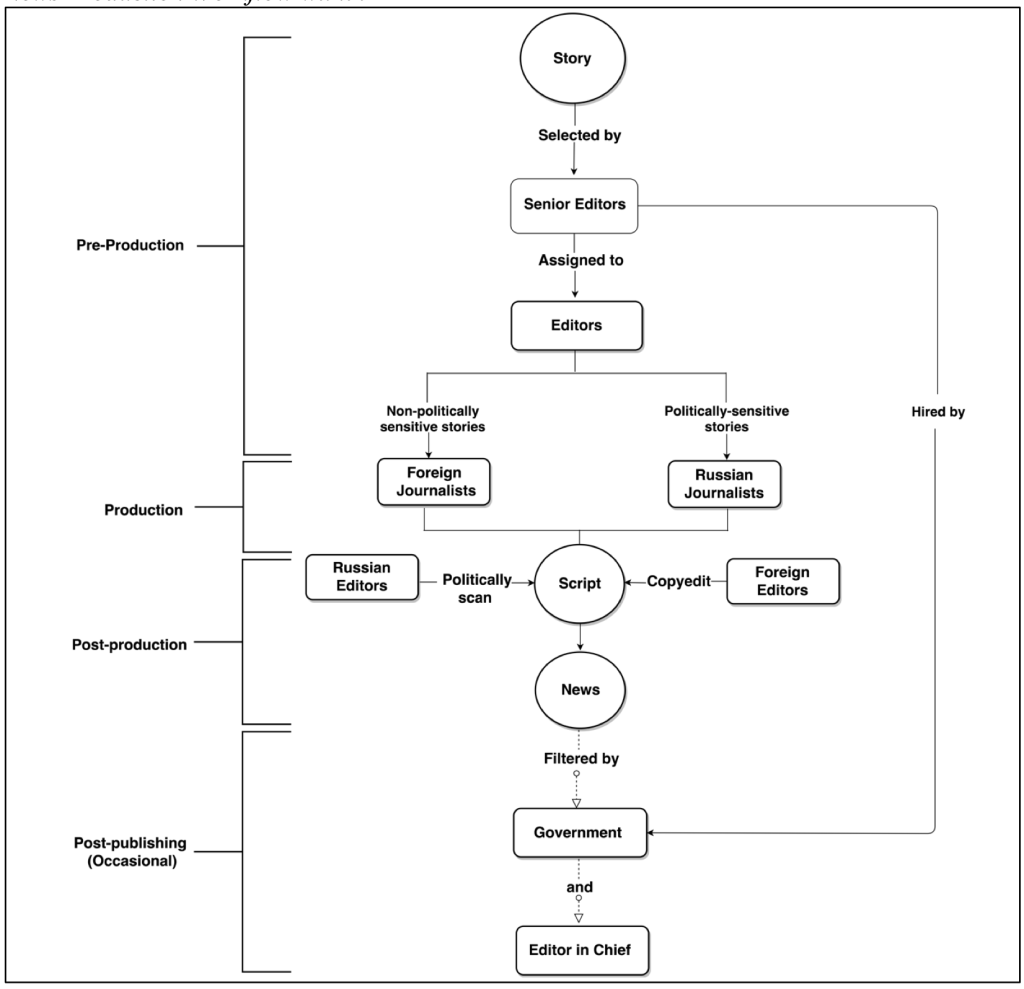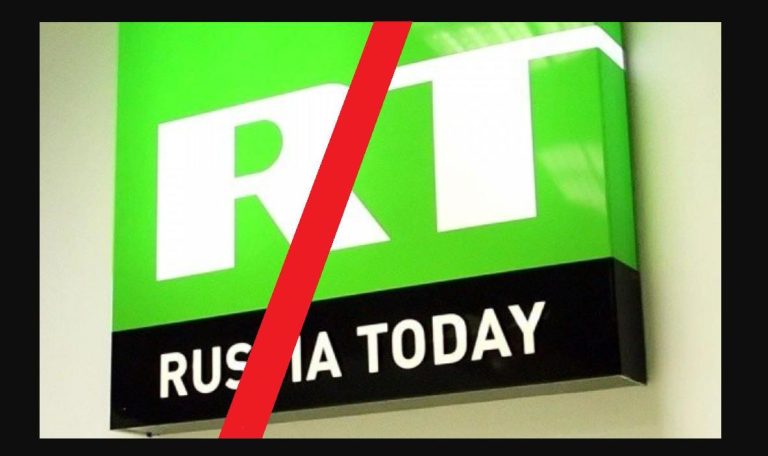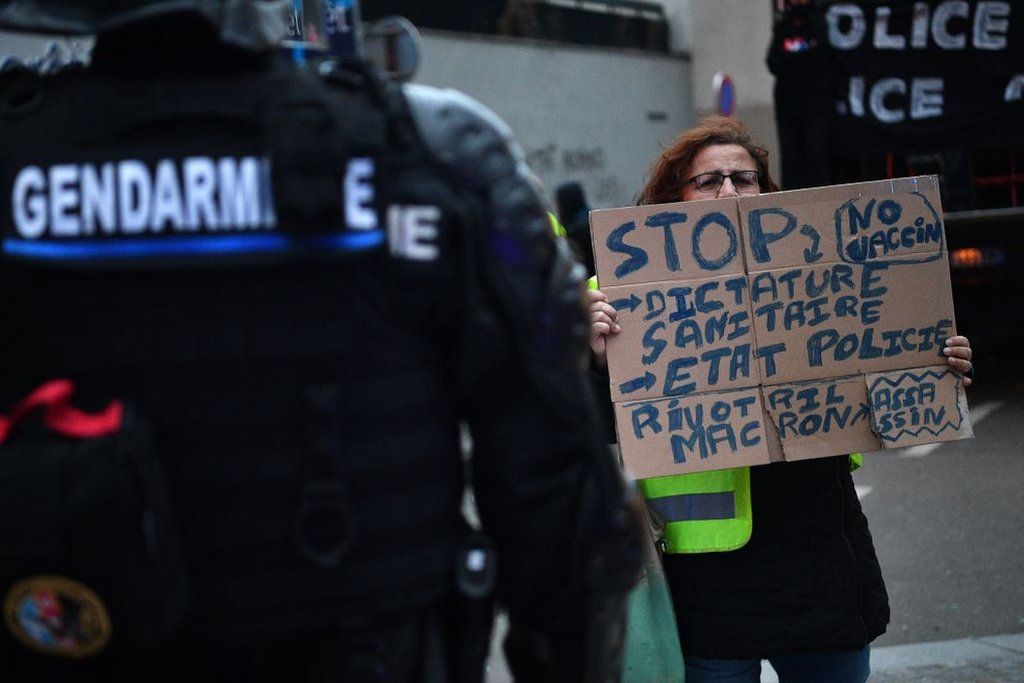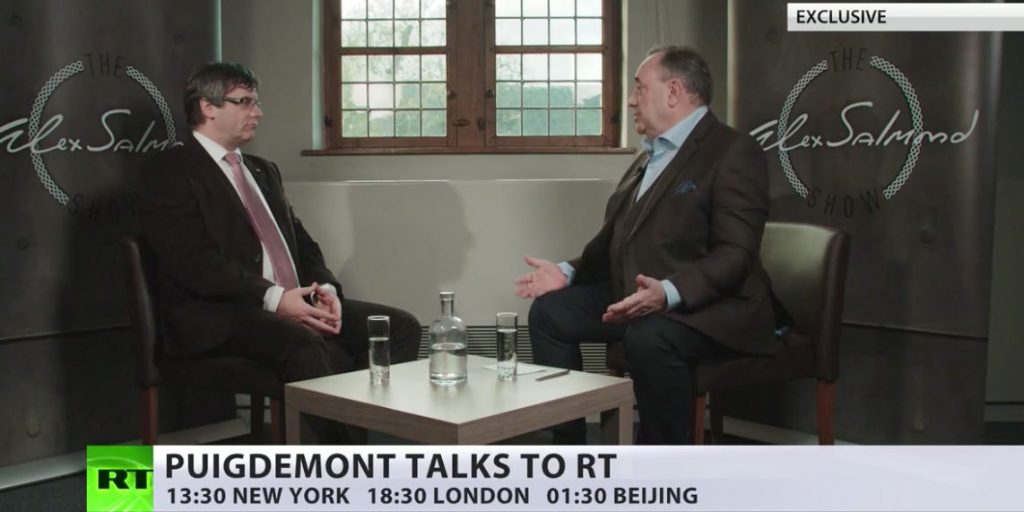Russia’s threats and subversive efforts in the information space of Western powers require rethinking of a concept behind the word “media,” as well as a ban on Russian state TV channels, affiliated with the Russian intelligence psyop units, spreading propaganda and circulating disinformation.
The German media regulator banned broadcasts of RT DE. The prohibition concerns all products of the Berlin-based RT DE Productions GmbH. According to the regulator, the Commission for Broadcasting and Media Supervision, the company bears responsibility for the shows aired in Germany in licensing terms. Due to the fact that RT DE Productions GmbH has never applied for a German broadcasting license, the regulator has banned all broadcasts of RT shows in Germany. This way, the commission upheld the December decision of the lower-tier, Berlin-Brandenburg media regulator (MABB), which prohibited RT DE broadcasts via the Eutelsat 9B satellite.
In late September 2021, Google removed from YouTube two German-language channels: Russia Today – RT DE and Der Fehlende Part (DFP). The reason behind the sacking was the spread of false information on COVID-19. Although RT DE had received a warning for uploading content violating the rules, the Russian broadcaster never fixed those breaches. In addition, the Russians attempted to mislead the platform by registering a new channel, RT auf Sendung, to broadcast RT content in German. It was also removed.
Later in December, the European satellite operator, Eutelsat 9B, at the request of the Berlin-Brandenburg media regulator (MABB), also removed RT DE from its channel pack.
In August 2021, Luxembourg also denied Russian’s RT a license to broadcast in German.
Following Germany, the French regulator, Arcom, launched an inquiry into RT France. Several associations have reported omissions in its coverage of crises, such as the Yellow Vest protests or the situation in Syria and the Central African Republic. All the topics mentioned are within the scope of interests of Russia’s military intelligence.
One of the main areas of disinformation efforts pursued by RT France is the topic of vaccines and protests against lockdowns, mask mandates, and covid passes.
The channel would live-stream protests for hours, also offering air time to the leaders of French anti-vaxxers. For example, on September 09, 2021, the outlet actively campaigned in support of the March in support of Anna Lisa Pena, who had gone on a hunger strike against the covid pass rule. RT France, just like any Russian propaganda resource, posts negative stories about AstraZeneca, Pfizer, and Moderna vaccines, at the same time promoting Russia’s pseudo vaccine, Sputnik V. In September 2021, RT via its Spanish-language page claimed that the G20 had allegedly recognized Sputnik V as the best tool to prevent coronavirus. In April, the Arabic edition published a fake story claiming that Germany was the leader in the covid spread and that only Sputnik V could save the nation.

Russians exaggerate any side effects of vaccines, regardless of the frequency of such cases. In just six months, more than 2,100 news pieces on RT France were devoted to vaccine issues. On average, the TV channel would post 12 reports on a daily basis, spreading malign narratives in this regard. Disinformation conceived by RT is then shared across social media by international groups of anti-vaxxers and covid-skeptics.
In matters of vaccination, RT offers diametrically opposing coverage to international and Russian audiences. These are some of the headlines from russian.rt.com:
• “You can’t stop”: Mishustin urges not to slow down pace of vaccination for coronavirus” – russian.rt.com (Russia)
• “State Duma Vice Speaker urges to explain need for COVID-19 vaccination” – russian.rt.com (Russia)
• “Moscow reiterates importance of wearing masks on public transport” – russian.rt.com (Russia)
And these are RT’s headlines for international broadcasting:
• “New CDC mask guidance creating a ‘caste system,’ dividing people into clean v unclean” – rt.com
• “Monterrey metro guards subdue a young man for not wearing a mask” – actualidad.rt.com
• “Vaccination rate does not affect spread of virus, study shows” – francais.rt.com
• “Significantly more children with vaccination reactions than with COVID-19 diagnosis in hospital” – de.rt.com
• “RT news service reports that more than 3,800 symptomatic COVID-19 cases have been reported in Germany among fully vaccinated since February” – stopvaczism
RT France is also influencing public opinion ahead of the French presidential election by promoting the narrative that President Emmanuel Macron is an anti-democrat making many questionable and authoritarian moves. Macron’s policy is commented on, compared with that of Vladimir Putin, who, on the contrary, is positioned as a consistent backer of coronavirus-related individual and collective freedoms. In this context, RT France supports such French politicians as the leader of the ultra-left “Insubordinate France” Party, Jean-Luc Mélenchon, leader of the far-right National Association Marine Le Pen, as well as Nicolas Dupont-Aignan of the right-wing Gaulist party Arise, France.

RT, as an instrument of Russian propaganda and disinformation, consists of the main English-language news outlet, RT International, the English-language TV channel operating in the US, RT America, as well as RT UK, RT Arabic, RT en Español, RT France, and RT DE. They also have in disposal an RT Documentary channel in English and Russian, the RT in Russian website, the Ruptly video news agency, and the Maffick media company.
The US State Department sees RT and Sputnik as Russian disinformation centers.
An analysis of the psyop run by RT abroad shows that Margarita Simonyan, RT and Sputnik’s editor-in-chief, is affiliated with the Russian Ministry of Defense and Russian military intelligence. Pursuing cover operations for the Russian Buk launcher crew that downed flight MH17 from the sky over the Donbas in 2014, whitewashing GRU hitmen who poisoned the Skripals in Salisbury, exerting informational pressure on Turkey in connection with the downing of the Russian Su-24 that violated the Turkish border with Syria, covering the Crimea annexation, and praising the explosions at the Czech arms depots all lie in the plane of media support for the operations run the Russian defense operatives.
It must also be noted that Simonyan kicked off her career as a war correspondent during the Chechen war, which indirectly confirms her ties with the GRU. In 2005, she even received a medal from Russia’s defense ministry. In 2008, she covered Russia’s military operation to seize control of South Ossetia, which also links her to the Russian defense agency. It was the latter that carried out the mission as part of the efforts to split Georgia and create obstacles to the nation’s NATO membership. On July 18, 2014, the outlet’s correspondent in London, Sarah Firth, filed a letter of resignation, protesting against the channel’s biased coverage of the Boeing 777 crash in Donetsk region. In a comment to Buzzfeed, Firth slammed the editors for their “disrespect for facts” as they placed the blame for the downing on the Ukrainian side. In her opinion, RT’s reporting style in relation to the armed conflict in eastern Ukraine is all about blaming Ukraine. On August 9, 2008, RT correspondent William Dunbar quit after his bosses killed a report about a Russian offensive on the Georgian city of Gori. On March 5, 2014, presenter Liz Wahl announced her resignation on the air, saying she could no longer work for the outlet, which is funded by the Russian government and “whitewashes Putin’s actions.” In March 2021, German journalist Daniel Lange, also working for RT, said he had been tasked with stalking opposition leader Alexei Navalny and his allies in Germany. In an interview with Bild, Lange claimed that the RT editors had told him to infiltrate the Charité clinic and find out how close he could get to the Navalny’s ward.

The common narrative for all RT’s editions is to portray the world in a way where all democracies have been engulfed in chaos, whereas the authoritarian system in Russia remains stable and isn’t prone to crises.
De facto, neither RT nor Sputnik are real media as they have nothing to do with journalism in its normal sense. This is a mechanism used for propaganda, disinformation, psyops, and manipulation in order to create a community of like-minded viewers and promote Russia’s foreign policy narratives. They have a significant impact on the process of shaping people’s worldviews.
Russian disinformation campaigns are decentralized, due to an ongoing rivalry between several content production and distribution centers close to the Kremlin.
Through irregular, hybrid operations, Russia is exploiting freedoms inherent in democracies, especially the freedom of speech and press, to undermine the Western liberal, democratic order. To this end, Moscow is putting in a spotlight on the already existing problems, relevant to a certain nation. This makes it difficult for a targeted government to tackle such psyops and disinformation campaigns.
As RT has been banned in Germany and remains under the investigation in France, similar sanctions and restrictive measures should also be introduced the UK, US, and Spain.
In Germany, RT focuses on xenophobic sentiments and support of nationalist circles. In Spain, on the contrary, the stake was placed more on the left segment through channeling anti-capitalist and anti-American rhetoric.
One of the main goals of this propaganda is to convince Spain to withdraw troops from the Baltic countries (where they are stationed under the NATO treaty). Also, as part of information campaigns, Moscow is trying to persuade Spain to lift Russia sanctions. Restrictive measures against Russian disinformation channels targeting Europe and the US must not be perceived as an infringement of freedom of speech, since this isn’t about the media, it’s about a hostile instrument of irregular operations, hostile propaganda, and psyops. Therefore, further geographical expansion of bans on RT broadcasting would reduce the risks of Russian malign influence, prevent election meddling, and curb the spread of disinformation and conspiracy theories posing a threat to democracy, rule of law, and security. The two Baltic nations – Latvia and Lithuania – have already banned RT. The logic behind the move to impose such a ban is that the outlet belongs to the Rossiya Segodnya agency, while the latter’s chief, Dmitry Kiselev, has been designated in the EU sanction list. Taking this into account, sanctions shall also be extended to the media group the media pundit leads.





